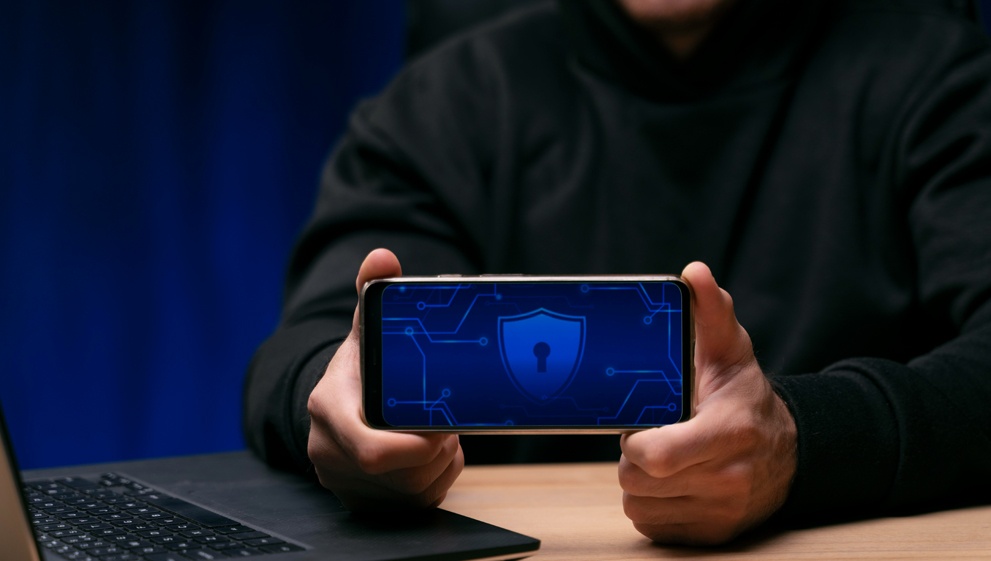Smartphones have become a human’s indispensable companion, holding the keys to our digital lives. From banking and shopping to personal photos and sensitive data, they have made our lives easier than ever before. However, this comes with a significant cost!
Since your smartphones handle a lot of sensitive data daily, they’re susceptible to online attacks by cybercriminals. With the alarming rise in mobile hacking – a staggering 2.2 million reported globally in December 2022 alone– understanding the threats and strengthening your phone’s defenses is necessary. This article covers all you need to know about mobile hacking, and what you can do to prevent it.
Common Methods Hackers Use to Hack Phones
Mobile Hackers employ a range of tactics to gain unauthorized access to your smartphone. Here’s a breakdown of common methods:
Phishing Attacks
Phishing is a deceptive practice where phone hackers trick you into revealing personal information through fake emails, text messages, or websites that look legitimate. For example, you might receive a message that seems to be from your bank, asking you to click a link and enter your account details. Once you do, the hacker gains access to your information.
Malware and Spyware
Malware and spyware are malicious software designed to harm your phone or steal information. They come in various forms, like viruses, trojans, and keyloggers. Hackers can install malware on your phone through infected apps, email attachments, or malicious websites. Once installed, these programs can track your activities, steal personal data, and even take control of your phone.
Bluetooth Hacking
Professional hackers can exploit open Bluetooth connections to access your phone when it’s in range. If your Bluetooth is on and not in use, it becomes an easy target. Phone Hackers can connect to your device and steal data without you even noticing.
SIM Card Swapping
SIM card swapping is a technique where phone hackers trick your mobile carrier into transferring your phone number to a new SIM card. Once they have control of your number, they can intercept calls and messages, including verification codes for two-factor authentication to access your accounts.
Signs Your Phone Might Be Hacked
Unusual activity on your device could be an indicator of a security breach. Keep an eye out for these warning signs:
- Unusual Battery Drain and Overheating: Malware can run in the background, consuming battery and processing power. If your phone suddenly starts draining battery faster than usual or overheating, it could be a sign of malicious activity.
- Increased Data Usage: Spyware might send your data to hackers, causing unexpected data usage spikes. Monitor your data usage, and if you notice any unexplained increases, it could indicate your phone is compromised.
- Unexpected Pop-ups and Apps: Malicious software often brings unwanted ads and installs apps without your permission. If you see strange pop-ups or apps you didn’t download, it indicates that your phone has been hacked.
- Strange Phone Behavior: Apps crashing, random reboots, and slow performance can indicate a compromised phone. Unusual behavior that you can’t attribute to a specific cause might mean a hacker has access to your device.
- Unauthorized Access to Accounts: If you notice unusual activity in your accounts, it could be a sign that your phone is hacked. Hackers might be using your phone to access your emails, social media, or banking information.
Preventative Measures to Protect Your Phone
Safeguarding your smartphone requires a proactive approach. Implement these measures to fortify your device’s defenses:
Keep Your Software Updated
Regularly updating your phone’s operating system and apps is crucial. Updates often include security patches that fix vulnerabilities hackers could exploit. Turn on automatic updates to ensure your phone is always protected.
Use Strong Passwords
Create strong, unique passwords for your accounts. Combine uppercase and lowercase letters, numbers, and symbols. Enable two-factor authentication (2FA) for an extra layer of security. Use a password manager that helps you generate and store complex passwords securely.
Be Cautious with App Permissions
Review the permissions requested by apps before installing them. Avoid downloading apps from untrusted sources. Limiting permissions helps protect your data from unauthorized access.
Install Security Software
Using antivirus and anti-malware software is essential. These programs can detect and remove threats before they cause damage. Quick Heal Total Security offers comprehensive protection against various threats, ensuring your phone remains secure.
Use a VPN
A Virtual Private Network (VPN) can enhance your phone’s security by encrypting your internet connection. This prevents hackers from intercepting your data, especially on public Wi-Fi networks. Using a VPN adds an extra layer of protection to your online activities.
Regular Backups
Backing up your data regularly ensures you don’t lose important information if your phone gets hacked or compromised. Use cloud services or external storage devices to keep copies of your data.
Take Control of Your Phone’s Security with Quick Heal!
Safeguarding your digital life starts with protecting your phone. By understanding the common tactics hackers employ and implementing proactive measures, you can significantly reduce your risk of falling victim to cyberattacks. Regularly updating your software and carefully reviewing app permissions are critical. For optimum protection, consider investing in Quick Heal Total Security, your one-stop shop for comprehensive phone protection from hackers.
Powered by AI, Quick Heal Total Security provides advanced protection against threats like ransomware and spyware. With features like zero-day attack prevention and protection against invasive trackers, Quick Heal Total Security effectively prevents phone hacking and safeguards your personal information, ensuring a secure digital experience.
Effectively protect your phone from phone hackers at just Rs. 1591 per year with Quick Heal!


